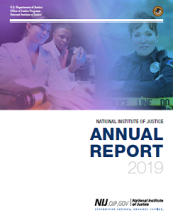Court research
Community Court Grows in Brooklyn: A Comprehensive Evaluation of the Red Hook Community Justice Center, Final Report
Domestic Terrorists' Contact with System Stakeholders Before Attacks
UNIFIED COURT SYSTEMS - A RANKING OF THE STATES
National Juvenile Court Data Archive
How Much Difference Does the Lawyer Make? The Effect of Defense Counsel on Murder Case Outcomes
National Institute of Justice Fiscal Year 2019 Annual Report
Assessing the causes of racial disparities in drug courts: An intersectional approach to eliminating barriers to admittance
Efficiency, Timeliness, and Quality: A New Perspective From Nine State Criminal Trial Courts (Full Report)
The Trouble with Harman and Lorandos’ Parental Alienation Allegations in Family Court Study
Sentence Boundary Detection in Adjudicatory Decisions in the United States
NIJ Multisite Impact and Cost-Efficiency Evaluation of Veterans Treatment Courts, Fiscal Year 2022
Deadline Notice
The deadline for the funding opportunity discussed in this video has passed.
See the YouTube Terms of Service and Google Privacy Policy
National Juvenile Court Data Archive
Research on Juvenile Court Intake Practices and Reoffending
Strengthening data-driven pretrial release in New Jersey
Prosecutor Priorities, Challenges, and Solutions
NIJ's Courts Research: Examining Alternatives to Incarceration for Veterans and Other Policy Innovation
Expanding Research to Examine the Impacts of Forensic Science on the Criminal Justice System
In 2004, the National Institute of Justice created the social science research on forensic sciences (SSRFS) research program to explore the impact of forensic sciences on the criminal justice system and the administration of justice. Much of the early research from the SSRFS program focused on DNA processing and the use of DNA in investigations and prosecutions.
See the YouTube Terms of Service and Google Privacy Policy




